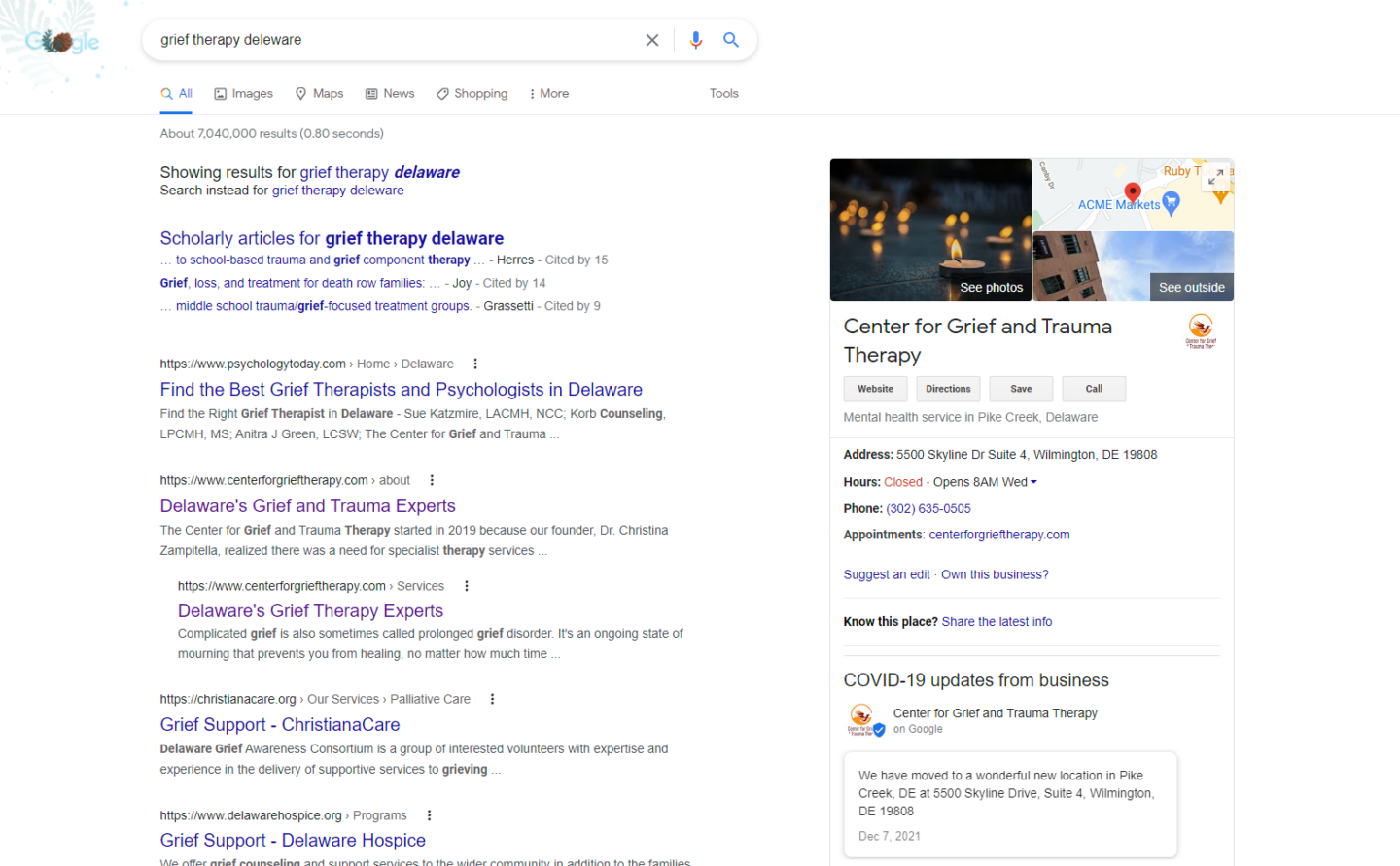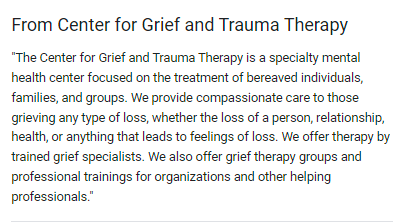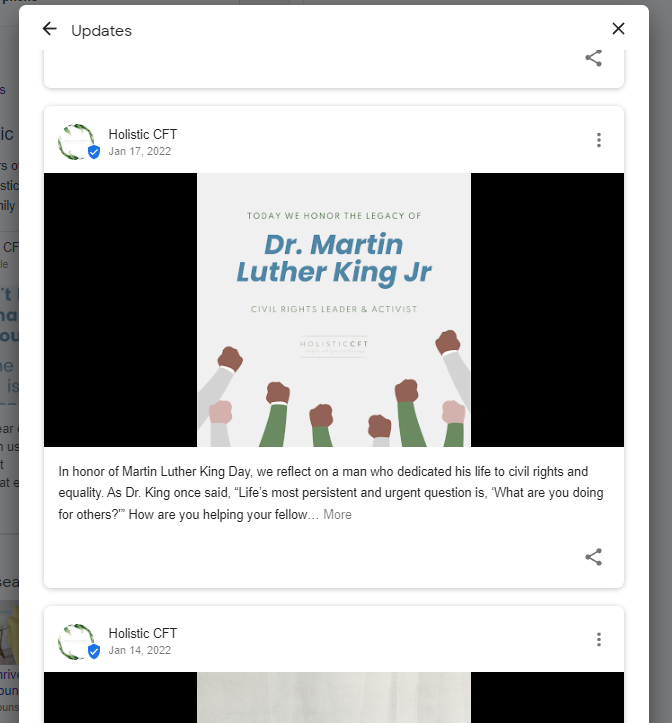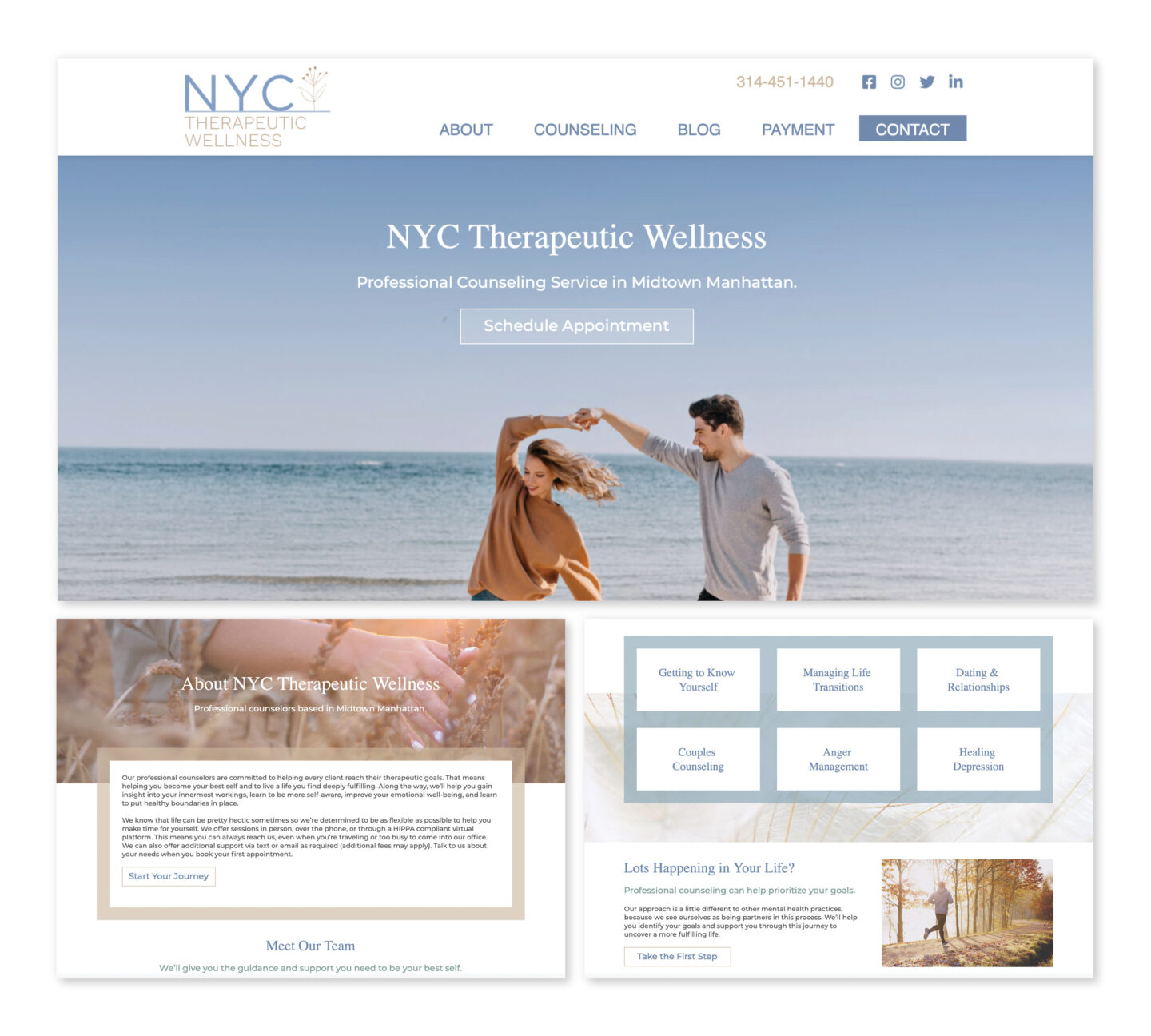While there has been a major uptick in the number of people accessing teletherapy and online mental services, there is still just as many people visiting mental health practices in person. As you look to grow your client base, you need to make sure that people looking for therapy in your local area can find you — and that’s where local SEO comes in.
While all of the same search engine optimization rules apply when marketing to a specific city or service area, there are a few extra bases you need to cover to ensure that your practice is at or near the top of the google search results for potential clients in your location.
Here are just a few statistics on why your marketing strategy for your mental health practice needs to focus on local SEO:
If you’re serious about growing your mental health clinic and want to get more qualified leads and patients in the door, you need to take a close look at if your practice shows up in local searches. If not, you’re missing out on a massive opportunity to help new clients and book more therapy sessions.
At Beacon Media + Marketing, we’ve watched clients take their place at the top of Google’s search rankings and experience impressive growth as a result. Here’s our expert guide to leveling up your therapist local SEO.
Want to leave your local SEO strategy to the experts? Learn more about our mental health marketing services.
1) Utilize Your Mental Health Clinic’s Google My Business Profile
Your Google My Business profile is the top tool you should be utilizing from your local SEO toolbox. People can’t book appointments with you if they can’t find your mental health clinic online. And if you don’t include information on your location, hours, and how to contact you, most searchers won’t take the time to look.
Ideally, when someone performs a local search on a keyword you want to show up for, your google my business listing shows up as well. For example, if you search “grief therapy Delaware” our client at the Center for Grief and Trauma is the featured listing.

As you can see, when performing this search on desktop, the Google My Business listing is the first thing to catch your eye. It’s visual, includes all contact information in one place, and stands out from any other mental health practice on the search engine results page (SERP).
What Factors Affect Google My Business Rankings
When someone performs a local search on Google, there are three ways Google ranks these results:
- Relevance: How well does the business match what the searcher is looking for? For example, if someone searches for couples therapy, practices that specialize in this service would ideally show up as one of the top listings.
- Distance:How close is a business to the location term or searcher’s location? If the searcher uses a specific location in their text, such as “anxiety therapy Sacramento,” Google uses this to find businesses nearby. However, if a more general search with terms like “depression counselor near me” is used, Google uses information they know on the searcher to pull local results.
- Prominence:How well known is the business? Google pulls information from the client’s listing, website, directories, and other factors to determine the credibility and popularity of businesses that match a search term. A business’s SEO position on the results page also affects this ranking — so the higher a business’s website ranks organically, the more likely a business is to come up higher in GMB listings.
How To Optimize Your Google My Business Listing
Now, what do you do if you search for your mental health practice and it doesn’t show up on Google Search or Google Maps? You need to make sure that your profile has been created correctly, is filled out thoroughly, and is SEO optimized for local searches.
To make sure your GMB is set up for success, make sure it includes the following factors:
1. Set Up Your Google My Business Listing
If you haven’t already done so, the first step to getting your mental health clinic on Google and boosting your local SEO is creating a free Google Business Profile. When setting up this account, you will need to enter your business name, address, contact information, business categories, and other information. It’s also possible that someone else has already listed your practice. In this case, you’ll need to claim your listing.
2. Verify Your Mental Health Clinic on GMB
Once your profile is created, Google will ask you to verify your business. The most common way this happens is via a postcard that is sent to the business location you included during the setup portion. It can take a couple of days for this to show up in the mail. This postcard will have a verification code on it that you need to enter into your profile. You may also have the option to verify by phone or email.
3. Optimize Your Listing for Local SEO
If you refer back to that handy local SEO statistics infographic, you’ll see that 92% of people choose a local business from the first page of the SERP. That means that if you don’t show up on the first page of Google, customers are unlikely to see or choose your mental health practice.
While we know that mental health websites are one of the most essential tools a therapist can have, a Google My Business listing is almost just as important. In fact, some sources claim that a complete and accurate GMB account gets on average seven times more clicks and 70% more location visits than uncompleted listings.
This means to get the most out of your local SEO efforts, you need to fill out every single section on your Google business profile. Of course, you need to have the correct location and contact information listed. And you need to keep your hours up to date.
Choose the right category for your mental health practice and include a full list of services you offer. You also want to select attributes and highlights that apply to your business. Google uses the attributes you choose to show up higher on the search listings for people searching for those features. For example, you can list attributes such as “online care” and “online appointment” if you offer teletherapy appointments, which helps improve your rankings for people in your area looking for online therapy services.
You also need to include a business description, which should naturally include SEO keywords. However, don’t use this spot to keyword stuff. You want to sound human and encourage searchers to click on your listing. It should give people a good overview of what makes your practice unique and how you help.
Here is an example of our Google My Business Listing description:

We’ve included SEO-specific keywords, such as our office locations, services, and credentials.
We also love the Center for Grief and Trauma Therapy’s description, which not only clearly lists their specialties and services but also captures their compassion and dedication to the clients they serve:

4. Maintain Your Google My Business Profile
More people are interacting with and using Google listings to make purchasing decisions. While about 50% of engagements with Google My Business listings are website clicks, many people search for the information they need in your listing. For this reason, you need to post regularly on your account, add plenty of pictures and videos, and interact with people who ask questions or leave reviews.
We recommend that you post onto your Google My Business account at least once a week. At Beacon, we manage several of our client’s GMB profiles and we treat them like a social media account. This is a great spot to post updates, such as a new office location or changed office hours, and to include links to blogs, special offers, and events. And we recommend that you try to upload a new photo or graphic at least once a week and new videos when possible.

Finally, if someone interacts with you on your Google My Business account, make sure not to leave them hanging! When someone asks a question, it’s likely other searchers have wondered the same. Use the Questions and Answers section to show people you’re active and give people more information about your mental health clinic. And any time someone leaves a review, whether it’s good or bad, always respond. It can be a simple thanks for some kind words about your office staff or an apology for a bad experience.
Need help managing your GMB profile? Here’s how we can help.
2) Optimize Your Website for Voice Search
Once your Google My Business listing is claimed, completed, and up to date, you’ve already taken a major step toward showing up for voice searches. And while most people focus their SEO efforts on written text, voice search optimization has taken off in recent years.
It’s estimated that 75% of US families will own smart speakers by 2025. While there are certainly some issues with accuracy for current voice technology (75% people of see that as being a major roadblock), more people are searching the internet without ever looking at a screen. And this is most significant for local searches.
One 2018 study found that 76% of smart speaker owners were using local voice search at least once a week. Whether looking for a new restaurant to eat at or asking for directions to a new store, people often ask their Alexas, Googles, or Siris to help them get there.
While location searches, such as “therapist near me” will pull up a google my business listing or Yelp listing, you also need to make sure your website is optimized for people who use voice search for finding industry-specific information.
One way you can do this is by incorporating questions and long-tail keywords. While someone typing into a search bar might use short keywords, such as “therapist Florida,” people often use longer phrases when speaking, such as “Who is the best therapist in Florida?” The ”People Also Ask” section of Google is a great place to find SEO-friendly questions and FAQs to add to your site to draw in more local website visitors.
3) Remember Mental Health SEO Basics
Any SEO mental health strategy, whether local or national, should follow SEO best practices. This includes a properly indexed, user-friendly site that focuses on relevant, high-quality content. Avoid publishing pages with low, unoptimized content. You want to aim for at least 300 words on each page with carefully chosen keywords that appear in multiple headings, the title, and throughout the copy. Be careful not to over-optimize — Google (and most likely your readers) is not a fan of keyword stuffing.
When focusing on local SEO, you want to incorporate location-specific keywords. Here’s a great example from our client NYC Therapeutic Wellness:

By targeting “Midtown Manhattan” in headings and other sections of the website, you can increase your chances of having your website rank high for mental health practices in your location. If you have practices in multiple locations, you’ll want a page for each city you’re located in to target local clients in each of those cities.
Learn about Google E-A-T and its impact on your SEO strategy
Not sure where to begin with your local SEO keyword strategy? Let our SEO experts help improve your rankings.
Boost Your Local SEO With the Mental Health Marketing Experts
At Beacon Media + Marketing, we specialize in mental health marketing, including website development, Google My Business management, SEO strategy, PPC advertising, blogging, and more. If you really want your mental health practice to show up higher in local search engine rankings, you need a robust, cohesive strategy that is designed with a small, local business in mind.
We’ve been serving small businesses in Anchorage, Reno, and other cities in the US for more than 20 years. And we’ve seen amazing success with therapists across the country in boosting their local SEO and growing their client base. We’d love to help you do the same.
Need help gaining new leads? Schedule your free consultation.